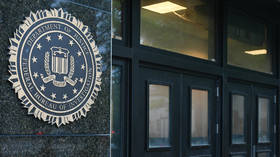‘Gitmo inmates won’t eat until they see cleared people leave’

The hunger strike at the Guantanamo Bay prison camp will continue until inmates see those cleared for release leave, Cori Crider, a lawyer working on several Guantanamo cases told RT. All of her clients, she says, object to being force-fed.
Crider argues that an independent team of doctors should be
allowed access to the facility to assess the mental health of the
inmates and confirm their right to go on hunger strike.
RT:Do you think Guantanamo officials will ever allow
doctors from the outside?
Cori Crider: There actually is a little bit of precedent for
this. We have seen mental health experts and others in
limited cases of litigation in Guantanamo be permitted to go down
and assess people. So, I certainly hope so. Because I can
tell you, all of our hunger striking clients don’t trust the
doctors. They tried again and again to raise these issues with
the medical staff. They say, ‘I reject this feeding, I reject
being medicated. Why are you involving yourself with this
practice?’ And the military doctors just shrug and say ‘I just
have to follow orders’, so yes I hope that the military and
certainly the commander in chief will take the request seriously.
RT:And some of these prisoners have already been
cleared for release but they’re still behind bars. How is that?
CC: That is exactly right. Eighty nine of the 166
prisoners are cleared for release in a process that required all
of the US intelligence agencies to be unanimous that it was safe
to send them, and still they are there. Fundamentally the problem
has been one of political will. Barack Obama has issued a lot of
fine words about his desire to close Guantanamo and he has taken
a few steps; I hope that his recent speech means that there would
be a few more steps but there are concrete things that he could
do to transfer the cleared men right now that he is not doing.
That is really disappointing to them. I don’t think people will
eat until they see cleared people leave.

RT:And if they are transferred as you say, wouldn’t
they just go to maybe another secure or secret facility?
CC: I hope not. A lot of people are free to stay at home
with their families that have been transferred from Guantanamo.
If you take Shaker Aamer, he has got a British wife and four
British children and there is no reason why he should not be on a
plane next week to go and be reunited with them. We were happy
that at the G8 summit this week David Cameron personally raised
the case with President Obama. But the tragedy is it seems to be
that level of engagement that is required. We have had all of
these people that had to starve themselves for four months, going
on five months now, just to get the world to sit up and pay
attention. It is a crisis. Guantanamo is in the worst crisis of
Barack Obama’s presidency right now and I just hope the
administration will try treating it as such.
RT:But does the US really have a choice besides
feeding prisoners? Letting them starve to death is the worst
option, isn’t it?
CC: I know that this is a complicated issue, but the
overwhelming weight of international law and just medical ethical
opinions says that the right thing to do in these circumstances
is to send independent doctors in, like the people that wrote the
letter to assess these people, to see that they are of sound mind
and making a free choice. So the doctors jobs is to have a real
conversation with someone and try to figure out if they are of
clear mind and if somebody says yes and if somebody is deemed in
their right mind than yes. It is difficult but the duty of the
physician is to stand aside. These people have been in prison for
nearly 12 years now. They see no end in sight and as hard as you
and I find it to imagine, I think the control over of whether or
not to eat is the last bid of dignity they have left.

The statements, views and opinions expressed in this column are solely those of the author and do not necessarily represent those of RT.












